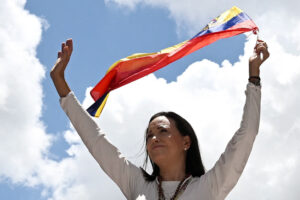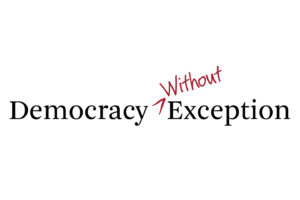
“This is a fight for the good. It’s a fight for life. It’s a fight for the truth.”
Those words, spoken by María Corina Machado during a virtual discussion hosted by the SNF Agora Institute at the Hopkins Bloomberg Center in Washington, D.C., captured the conviction that would later earn her the 2025 Nobel Peace Prize. The event, held while Machado remained in hiding, brought together SNF Agora Senior Fellow Anne Applebaum and David Smolansky, then the institute’s Visiting Fellow Dissident in Residence, to discuss Venezuela’s “epic movement toward democracy” and how citizens sustain democratic life under authoritarian rule.
Ten months later, the Norwegian Nobel Committee recognized Machado “for her tireless work promoting democratic rights for the people of Venezuela and for her struggle to achieve a just and peaceful transition from dictatorship to democracy.” The committee praised her as “a brave and committed champion of peace who kept the flame of democracy burning amidst a growing darkness.”
Exiled for opposing Nicolás Maduro’s government, Smolansky opened the conversation by describing how Venezuela’s opposition had revived civic hope through participation. “Many people in Venezuela were hopeless,” he said. “Everything seemed very dark. And yet 2.6 million people went to vote and elected María Corina Machado as the democratic opposition leader.” He called the primary “the biggest civic achievement in our country,” a demonstration of public resolve despite repression and fear.
Machado joined from inside Venezuela, speaking with measured calm. “We didn’t follow one single rule,” she told Applebaum. “People said we had to polarize. Instead, we united. We had no money. Everything was done by the people. We didn’t have posters or flyers. Everything was made by citizens who wanted to be part of this movement.”
That sense of shared ownership, she explained, turned a campaign into something larger. When barred from running for president, she endorsed former diplomat Edmundo González Urrutia and helped organize a nationwide network of volunteers to monitor polling stations. “We went under conditions that no democratic society in the world would accept,” she said. “Nonetheless, we trained hundreds of thousands of volunteers. When the day came, we scanned and uploaded the original tally sheets for the whole world to see.”
Machado called it an “epic civic movement” built on trust. “Their fraud was met with our proof,” she said. “We fought their electoral engineering with electoral intelligence.” Her remarks reflected the same effort later cited by the Nobel Committee as an example of peaceful democratic resistance under authoritarian rule.
Applebaum, whose work examines the rise of autocracy, asked how Machado sustained hope amid arrests and intimidation. “We understand the nature of the regime we’re facing,” Machado replied. “This is not a conventional dictatorship. It is a criminal system. Every day that goes by, Maduro loses support.”
Throughout the hour-long conversation, Machado returned to the idea that Venezuela’s democratic movement had become as much moral as political. “We reached out, listened, opened our hearts, and realized that we really shared longings,” she said. “People do not want handouts. They want to be productive, to depend on their own efforts and work. They told me, ‘María Corina, please bring my kids back home.'” That plea, she explained, revealed both the heartbreak and unity driving the movement. “Chavismo divided families to make us weaker,” she reflected. “It backfired. It turned our movement into one of redemption for the reunification of our families and the liberation of our country.”
Applebaum closed by acknowledging the optimism both Machado and Smolansky embodied. “I’m very often asked who the optimists are,” she said. “I mean people like both of you who continue to work in the most difficult circumstances, who continue to see possibilities for change.”
Machado smiled. “During these years, there’s one thing I constantly heard: ‘That’s impossible.’ To bring the country back together? Impossible. To win the election? Impossible. Well, we did it. We made possible what they thought was impossible.”
For Smolansky, the Nobel recognition confirmed what many Venezuelans already believed. “She was not only elected to be a candidate,” he said during the event. “She was elected to be a leader. And she has behaved as a stateswoman, facing repression, persecution, and threats, not only to herself but to many who have worked in our movement.”
The conversation stands as a record of that leadership and of the kind of dialogue the SNF Agora Institute seeks to foster. It reminds us that democracy endures through the courage of citizens. In moments like these, conversation itself becomes an act of democracy, a space where truth, courage, and civic responsibility take form in words shared across borders. Venezuela’s struggle for freedom continues, and dialogue remains one of democracy’s most powerful defenses.
Watch the whole conversation: Venezuela’s Epic Movement Toward Democracy

